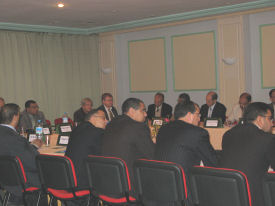|
In this issue:
The INECO Stakeholder Assembly Workshop - Consolidating the progress made
Defining an action plan for improving efficiency in
irrigation water use in the Oum Er Rbia
Hydraulic Basin, Morocco
Prioritization and analysis of management options for mitigating
water stress in the Damour River Basin, Lebanon
Defining means to address industrial pollution in the Seybouse River Basin, Algeria
New INECO Deliverables
The INECO Consortium |
|
Outcomes of the INECO Morocco Case Study
Defining an Action Plan for improving efficiency in irrigation
water use
|
|
Dimensions of irrigation water use in the Oum Er Rbia
Hydraulic Basin
|
|
The Oum Er Rbia (OER) Hydraulic Basin is of strategic
importance in Morocco as:
-
The water resources of the basin are extremely
important, as they are used in the strategic economic zone of Morocco
(Tadla, Doukkala and the inshore zone Casablanca-Safi);
-
The area concentrates economic activities (industry and
irrigated agriculture) and a significant part of the
population;
-
The OER basin has already been the subject of important
investments on hydraulic infrastructure. The basin has the
largest number of dams among Morocco basins.
-
The region that includes the OER basin and the adjacent to
the south region, which depends for its water supply on the
OER resources, is under water stress. Therefore, the Basin
Agency is mainly oriented towards water demand management
issues.

The increasing water stress experienced in the Oum Er Rbia
Hydraulic Basin calls for a shift in water management
policies, from the traditional, supply-side approach to
demand management. As agriculture is the represents more
than 80% of the total water demand, efforts focus primarily
on increasing efficiency in irrigation water supply and use.
|
Highlighted aspects of the issue concern:
-
The "Sharing" dimension:
Water available for irrigation is shared with municipal uses and is also
used for hydroelectricity production. In the latter case, the
intermittent nature of flow for hydroelectricity, in order to meet peak
energy demand, causes problems in downstream irrigation, as farmers
require stable flows to irrigate. In this regard, and as the value of
water in hydroelectricity is higher, it is necessary to ensure that the
operational rules of the dam are known and understood by farmers, so
that they can appropriately schedule the irrigation of their fields.
-
The "Valuing" dimension:
Current economic incentives provided by the State for the installation
of modern irrigation systems are considered inadequate both by farmers
and by decision-makers. It is thus recommended to: (a) increase the
subsidies offered, and (b) direct grants to those who install
the equipment, so that farmers do not have to pay the purchase and
installation costs in advance and get the compensation/grant at a later
stage.
-
The "Governing" dimension:
There is need to reinforce, by elaboration of the corresponding
legislation and capacity building, the role of water user associations.
Water user associations should take a more effective lead in developing
farmers’ capacity, by providing training and education programmes, and
act as intermediaries between individual users and decision-makers.
|
Decided action plan |
|
One of the main outcomes of the local INECO Stakeholder Workshop implemented
in Afourer, in March 2008, was the definition of an action plan oriented
towards improved efficiency in irrigation water use.
The main axes of this plan, jointly agreed upon by the 35 stakeholders that
participated in the event, included: (a) the enhancement of incentives for
water conservation; and (b) the strengthening of the overall framework for
the management of water resources in the Basin.
For the first objective, the following were agreed upon:
-
Directing the 60% grant provided through the Agricultural Development
Fund directly to those who install water saving equipment; the measure
could address a common problem that small landowners face in paying the
initial installation of equipment;
-
Making water saving a regional priority, following the Souss experience,
where water saving projects will be carried out as part of a partnership
between the state (60%), the ABH Souss (20%) and the regional assembly
(20%);
-
Carrying out investigations on the cost per m3 of water saved
and the corresponding positive economic impacts on farmers;
-
Initiating the dissemination of legislative texts which regulate agency
assistance in terms of water saving;
-
Developing equitable mechanisms for the sharing of costs relating to the
management and maintenance of water conveyance networks.
|
Suggested actions towards
institutional reform and capacity building comprised the:
-
Undertaking of initiatives to avoid overlaps between institutions involved in water
management, by also strengthening the role of coordination structures such as the Basin
agencies;
-
Empowerment of water user associations so they can
foster capacity building of farmers (education,
training, increased awareness, etc.) and act as
intermediaries with public authorities. In this respect,
it is recommended to revise regulatory texts which
concern agricultural water user associations in a way
that allows more effective action;
-
Encouragement of public-private partnerships;
-
Involvement of politicians, researchers and users
(farmers, ORMVA, ONE, professional associations, etc.)
and the private sector in the overall process;
-
Creating a strategic tracking unit, as means to obtain
experience from initiatives developed in other regions.

The Morocco Stakeholder Workshop
participants, Afourer, March 2008
|
 |
|